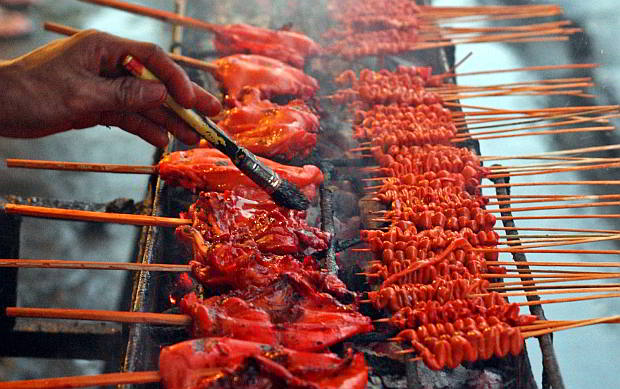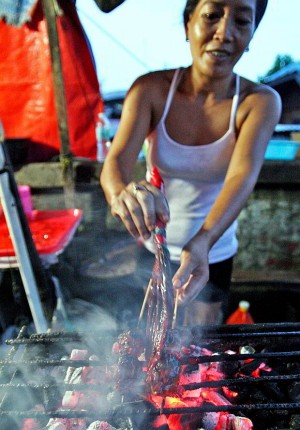Cebu city barbecue vendors may be using paint brushes with toxic lead content

The metal in paint brushes may contain lead and flake off, contaminating food like barbecue where many vendors use store-bought brushes to baste meat on the grill like this barbecue stall in P. del Rosario Street, Cebu City. (CDN PHOTO/ JUNJIE MENDOZA)
Ramil tends to his grill on P. del Rosario Avenue in Cebu City.
After 6 p.m. customers start lining up to buy sticks of sizzling meat barbecue for supper.
The vendor uses a small paintbrush to baste the pieces of chicken pork, chorizo and hotdogs with a mixture of cooking oil and spices.
The brush, commonly used by barbecue vendors, is a convenient, inexpensive tool.
What he may not know is that several hardware store-bought paintbrushes are made with lead, a toxic metal.
Environment watchdogs sounded the alarm on potential lead contamination of Cebu City’s famed barbecue trade after finding street vendors in the Carbon Market area applying basting sauce on chicken and pork barbecue with paintbrushes that are supposed to be used to apply paint, not for contact with food.
A hand-held X-ray Fluorescence (XRF) device was used to check paintbrushes purchased in six Cebu city hardware stores.
“Our joint investigation with the Cebu-based Philippine Earth Justice Center proves that paintbrushes often used for greasing barbecue contain elevated levels of lead,” said Thony Dizon, coordinator of the Quezon City-based EcoWaste Coalition.
Out of 19 paint brushes, 16 were found to contain lead at levels way above the tolerable limit of 90 parts of million (ppm) set by the United States for lead in paints and surface coatings.
They contained lead in the range of 309 parts per million (ppm) to 10,500 ppm. The brushes of different sizes sold for P5 to P119.
Dizon said the results raise the possibility of the basting sauce of streetfood barbecue being contaminated with lead from the paint brushes, especially if the metal part of the brushes have started to flake from frequent use.
Ramil, whose barbecue stall draws many customers with its location near boarding houses, a university and a bus terminal, said he had heard that using a paintbrush has its risks.
“Sauna raman ko nakabalo ana kay naa daw kuyaw nga chemical nga naa sa brush. Pero, mo sunod ra sad ko kung unsay paliton sa tag-iya,” Ramil told Cebu Daily News.
(I heard before that it’s not safe because there are chemicals in the brush. But I just follow what the store owner gives to me for use.)
As night falls, customers crowd around the grill looking for a hot meal.
His paintbrush is soaked in a small plastic container of cooking oil and flavoring.
Cebu Daily News bought a stick of longaniza (sausage) links for P22.
A coworker, John, used the small brush to apply cooking oil smoothly on each side. The faded label on the paintbrush made it difficult to read the brand.
After five minutes on the grill, the longaniza was cooked. Customers bring it inside the store to eat or ask for ketchup and hot sauce, which a female cashier applies on the food with another paintbrush.
TANGLAD BRUSH
Not all barbecue vendors do the same.

Another vendor in T. Padilla uses a safer method by making her own brush of lemon grass (“tanglad”) leaves. (CDN PHOTO/ JUNJIE MENDOZA)
A nature-based, cheap alternative is available.
In T. Padilla Street, 38-year-old vendor Mercelita dela Cruz makes her own brush out of a bundle of tanglad (lemon grass) leaves.
Dela Cruz, who’s been in the business for almost 12 years, said she used to handle a paintbrush for basting when she was still operating two years ago in Larsian, Cebu City’s famous streetfood barbecue center near Fuente Osmeña.
“We were told in a seminar of the Cebu City Health Department that it wasn’t safe to use paintbrushes so I decided to use tanglad leaves instead,” she said.
The leaves are tied with plastic string and is replaced every two days.
She said a paintbrush would turn rusty after constant use.
She also got complaints from customers who were afraid the brush had been in contact with hazardous chemicals.
“Makuyawan sad ta ana kay ang ako sad gihuna-huna ang safety sad sa akong mga customers,” she added.
(I would also get worried because I also think of the safety of my customers.)
The test results by independent environment groups showed the risk was real.
“The results of our probe should prompt the authorities to initiate an information drive regarding the hazards of misusing lead-containing products, especially for food preparations,” said lawyer Gloria Estenzo-Ramos, PEJC coordinator in Cebu.
CALL TO ACTION
“We also hope that our findings will induce hardware stores to demand lead-free paints and paintbrushes from their suppliers in order to safeguard public health,” she added.
The groups also urged the City Council to craft an ordinance that will ban the use of paintbrushes for food applications as a precaution against lead contamination, which could result in adverse health effects, especially among children.
None of the paintbrushes had warning labels or identified the lead content.
There was no caution given that the paintbrushes should not be used when preparing food.
Related Stories:
Colorful school campaign counters lead-based paint
Banned watercolor still sold in Cebu stores — EcoWaste
Disclaimer: The comments uploaded on this site do not necessarily represent or reflect the views of management and owner of Cebudailynews. We reserve the right to exclude comments that we deem to be inconsistent with our editorial standards.
